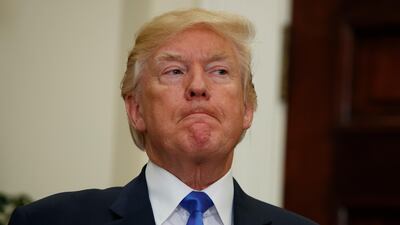US president Donald Trump accused Russia of "subversion and destabilisation" on Wednesday in a rare display of public criticism towards Moscow, as he added his final signature to a bill relating to sanctions on Russia, Iran and North Korea.
The “Countering America’s Adversaries Through Sanctions Act”, which received overwhelming backing from members of Congress is now US law.
“America will not tolerate interference in our democratic process, and … we will side with our allies and friends against Russian subversion and destabilization,” Mr Trump said, adding also that he favoured tough measures to "punish and deter bad behavior by the rogue regimes in Tehran and Pyongyang”.
Mr Trump has so far been reluctant to publicly accept US intelligence conclusions that Russia interfered in the 2016 election which saw him elected to president.
Despite these remarks, in typical Trump fashion he also called the bill he had just signed “flawed” for constraining the White House's ability to negotiate with or about these countries.
“The bill remains seriously flawed — particularly because it encroaches on the executive branch’s authority to negotiate,” he said.
Mr Trump also warned that the new law “will drive China, Russia, and North Korea much closer together”. He justified signing it for the sake “of national unity".
"It represents the will of the American people to see Russia take steps to improve relations with the United States,” he said.
The new law forces Mr Trump to get approval from Congress before making any significant changes to Russian sanctions. Such changes would be contingent on Congress accepting or rejecting them within a period of 30 days. Such restrictions are only applicable, however, to projects where sanctioned Russian entities have at least a 33 per cent interest.
The legislation also imposes new sanctions on Iran’s ballistic missile programme and Revolutionary Guard network, and goes after North Korea’s shipping industry as well as its nuclear and ballistic missile programmes.
The bill passed the House of Representatives by a margin of 419 votes to 3, and the Senate by 98 votes to 2 last week.
Mark Dubowitz, an expert on sanctions at the Washington-based Foundation for Defense of Democracies think tank, told The National that "the overwhelming bipartisan support for the Iran, Russia and North Korea sanctions left the [Trump] administration little choice but to sign the legislation."
If the White House had vetoed the bill, Congress would have had the numbers to override that veto.
Mr Dubowitz called the legislation "a step in the right direction against three dangerous regimes", saying "the bill imposes tough sanctions against the IRGC (Islamic Revolutionary Guard Corps) and those supporting Iran's missile programme while creating much greater risks for foreign companies engaging with an Iranian economy over which the IRGC has enormous control".
"The legislation also squeezes the hard currency earnings of both Moscow and Pyongyang as both regimes continue to increase their threats against the US and our Middle Eastern and Asian allies," he added.


